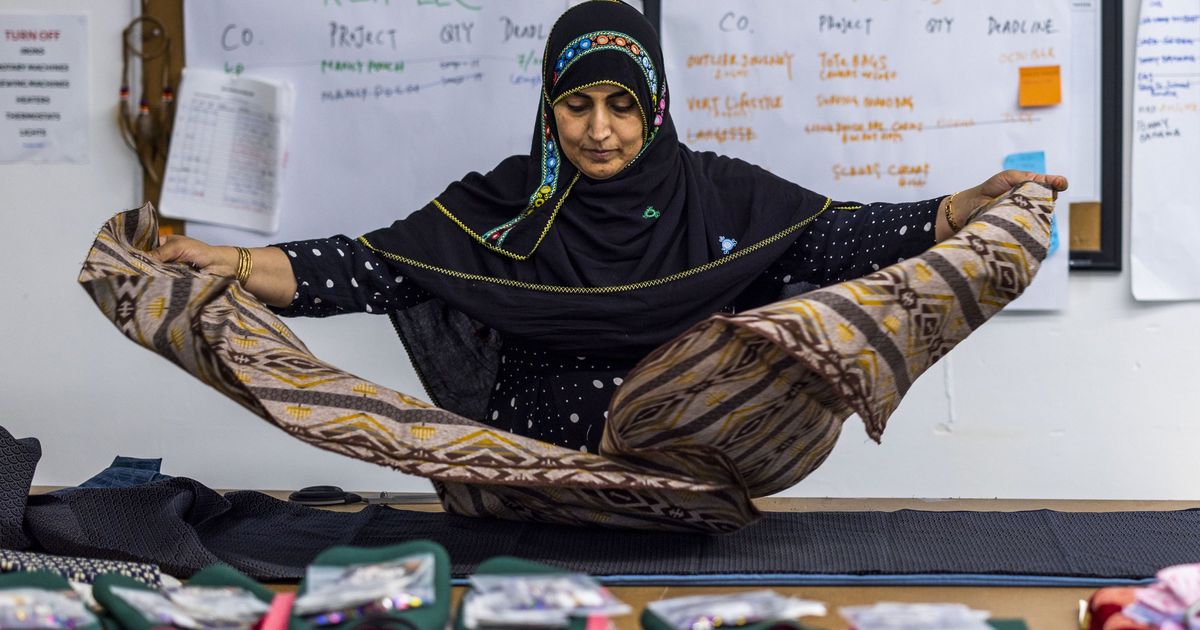- September 21, 2022
- No Comment
- 6 minutes read
Seattle refugees turn junk into tote bags, medical scrubs and dog toys – The Seattle Times

In a nondescript workshop in Seattle’s Lake City neighborhood, squeezed between a restaurant and a convenience store, surplus bed sheets are sewn into medical scrubs, used coffee sacks are fashioned into burlap tote bags and decommissioned fire hoses are cut into storage baskets.
Refugee and immigrant women from countries like Afghanistan, Myanmar and Ethiopia are trained to do the work, which Refugee Artisan Initiative Executive Director Ming-Ming Tung-Edelman calls “upcycling” — transforming waste materials into products with practical and artistic value, rather than keeping them in warehouses and dumping them into landfills.
“You see that stack of napkins?” Tung-Edelman asks, pointing past a dozen sewing machines toward a table piled with colorful linen triangles. “Deadstock fabric, left over from a Tommy Bahama clothing line.”
The nonprofit that Tung-Edelman started in 2017 provides the artisans with new skills, a special community and the means to earn a paycheck from home, earning $20 an hour for piece work.
The women face various barriers to other employment, partly because some speak limited English. But every Thursday, they visit the RAI workshop to pick up materials and drop off completed products. Some live in Lake City and some in other neighborhoods, within and outside Seattle.
Nilofar Hessary’s income helps her family pay rent and support relatives back in Afghanistan, where she lived with her husband and three children until mid-2021, just before the Taliban seized power. Her 4- and 5-year-old girls play together while she sews.
“This is a good program because we can … make some money and take care of our children,” said Hessary, 27, speaking Dari translated by her husband, Ghulam Hessary, 37, who worked for the U.S. in Afghanistan as a security officer, driver and logistics specialist.
“It keeps her busy,” so she doesn’t dwell on the dangers her relatives are facing, Ghulam Hessary added.
Tung-Edelman, an immigrant from Taiwan and retired pharmacist, started RAI out of her car, driving from Everett to Auburn to connect with new arrivals. She views sewing as a “universal language,” recalling the clothes her grandmother in Taiwan once stitched by hand.
The nonprofit found a home in Lake City when a friend connected Tung-Edelman with a Children’s Home Society of Washington business incubator program, which slotted RAI into a vacant commercial space. The effort really took off with about 40 women showing up to a recruitment event.
“I realized there was definitely a need,” Tung-Edelman recalled.
The artisans were making fabric jewelry and home goods when COVID-19 hit in 2020, spurring demand for masks. They pivoted, churning out 80,000. By the time snow damaged their space last winter, RAI was ready to expand. With funding from King County, the organization bought its current headquarters, an old woodworking business down the street, opening there in February.
“This is an innovation lab,” where RAI staffers experiment with new ideas, production manager Alpaja Rajbhandari said. They hone prototypes, then record video tutorials for the artisans.
RAI accepts fabric donations by the pound and sells some products (coasters, tea towels, the burlap totes) through an online store (no walk-in shopping). The organization, which established a for-profit arm last year to pursue small-batch manufacturing contracts reserved for women- and minority-owned businesses, also works directly with companies and other organizations on specific projects.
For example, it’s making the napkins for Tommy Bahama to sell in stores, supplying certain Swedish Health Services departments with scrubs, exploring a partnership with Climate Pledge Arena to sew tote bags out of concert banners, and using fire hoses from the U.S. Forest Service to make baskets and dog toys, and it wants to use foil coffee bags to create sleeping bags that convert into hybrid backpacks/jackets.
RAI may get help from a state program to market the hose products and is negotiating with the county’s Solid Waste Division to fund the foil-shelled, fleece-lined sleeping bags for people experiencing homelessness.
Most projects involve upcycling, though it may buy materials for large orders.
RAI has about 20 artisans who can earn several hundred dollars each week and some artisans who’ve become staffers, plus trainees. Eight women from Lake City just completed a no-cost, eight-week sewing class.
Training will be the challenge as RAI grows. Many women want to join, but their abilities vary. Some are beginners, and some have only used foot- or hand-operated machines, rather than electric, Tung-Edelman said.
Rajbhandari uses a spreadsheet to match each artisan with appropriate work. Her reward is watching the women build confidence, she said.
“They can be the one earning a paycheck in the U.S.,” Tung-Edelman said, mentioning an artisan who saved enough to buy a car.
Baseerah Salim, an artisan who recently became an RAI staffer, learned to sew from her mother in Afghanistan. The work allows her to share that experience with others, she said. She bakes cookies for the artisans, who bring their children to the workshop.
Which project has been her favorite? Tough question, said Salim, 41.
“Every one is a favorite.”
This coverage is partially underwritten by Microsoft Philanthropies. The Seattle Times maintains editorial control over this and all its coverage.
The opinions expressed in reader comments are those of the author only and do not reflect the opinions of The Seattle Times.

